
Most Ukrainians express a positive attitude towards Switzerland, although a significant proportion of respondents remain neutral. This is evidenced by the results of a nationwide sociological survey conducted by Active Group in collaboration with the information and analytical center Experts Club in August 2025.
According to the data, 60.3% of Ukrainians have a positive opinion of Switzerland (42.0% — mostly positive, 18.3% — completely positive). Only 1.7% of respondents expressed a negative attitude (1.3% — mostly negative, 0.3% — completely negative). At the same time, 36.7% remain neutral, and 1.7% said they did not have enough information about the country.
“Ukrainians associate Switzerland with reliability, stability, and humanitarian support, which the country provides in difficult times. The high level of trust indicates Switzerland’s positive image, despite a certain detachment in global politics,” commented Active Group co-founder Oleksandr Pozniy.
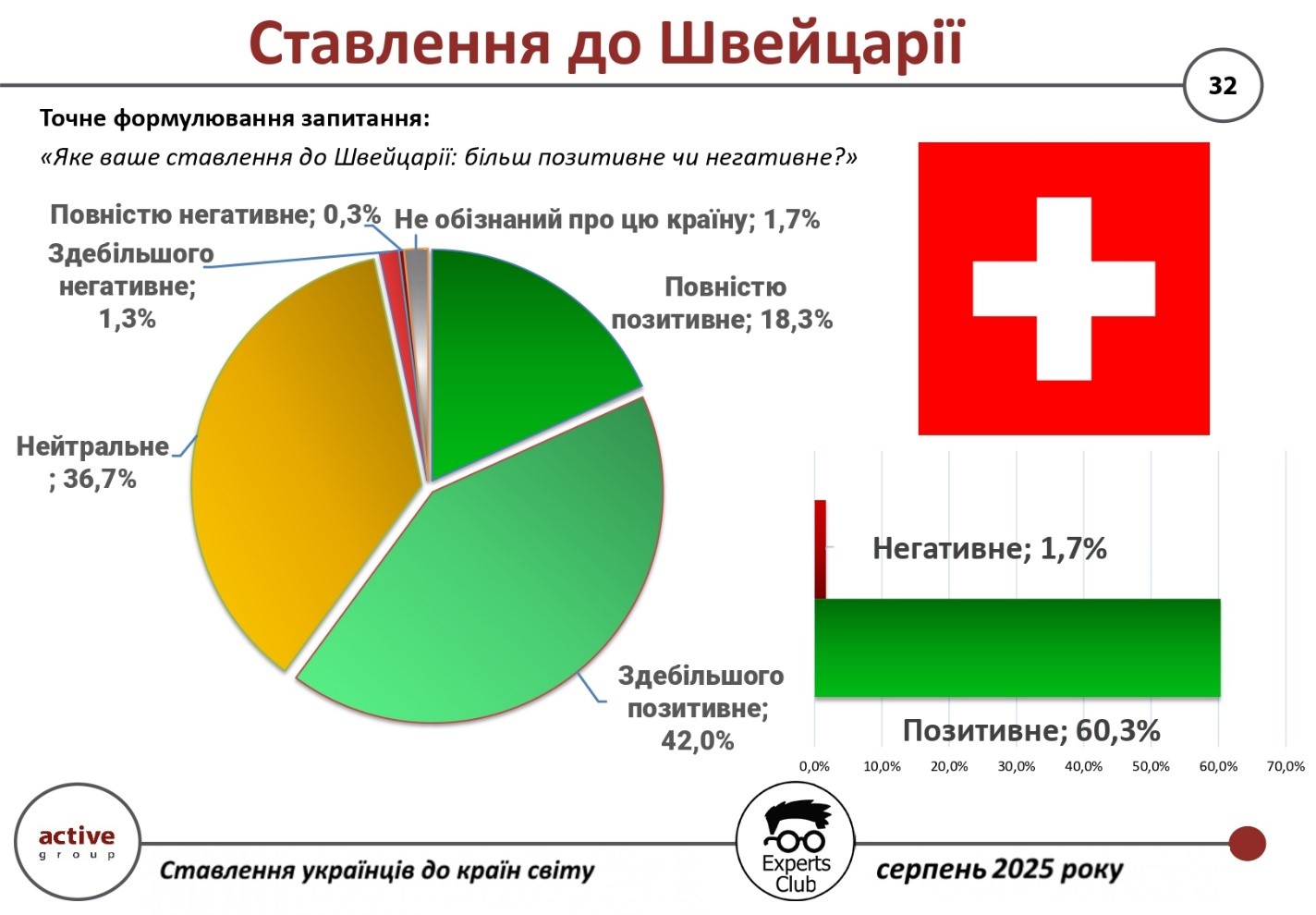
In turn, Maksim Urakin, founder of Experts Club, emphasized economic ties:
“In the first half of 2025, trade turnover between Ukraine and Switzerland exceeded $928 million. At the same time, Ukrainian exports amounted to only $44 million, while imports from Switzerland reached almost $884 million. The negative balance of more than $839 million is significant, indicating Ukraine’s substantial dependence on imports from this country,” he stressed.
The survey was part of a broader program of research into the international sympathies and antipathies of Ukrainians in the current geopolitical context.
The full video can be viewed at: https://www.youtube.com/watch?v=YgC9TPnMoMI&t
You can subscribe to the Experts Club YouTube channel here: https://www.youtube.com/@ExpertsClub
ACTIVE GROUP, DIPLOMACY, EXPERTS CLUB, Pozniy, SOCIOLOGY, SWITZERLAND, TRADE, URAKIN

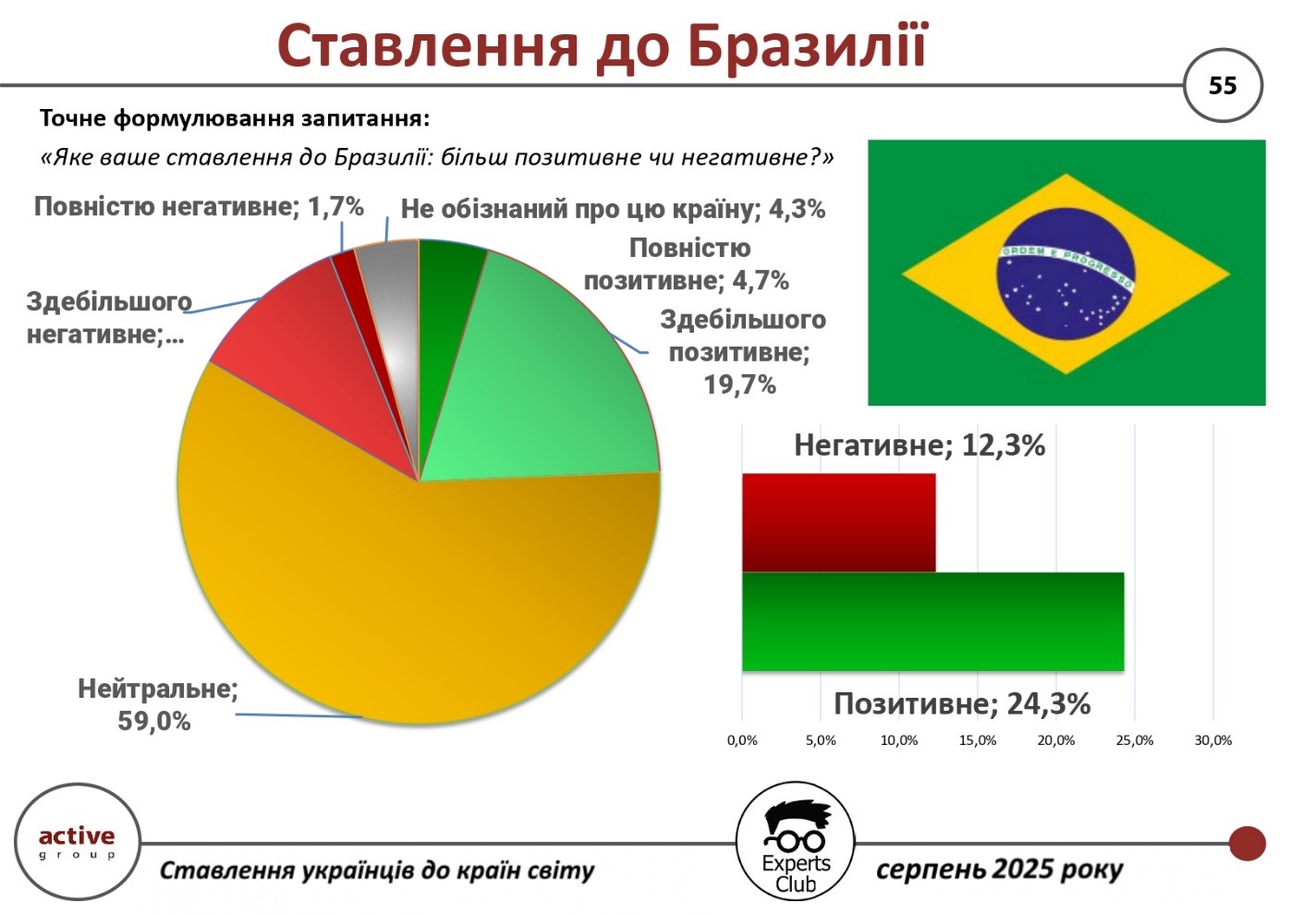
The majority of Ukrainians have a neutral attitude toward Brazil, according to a survey conducted by Active Group and the Experts Club.
According to the survey, 59.0% of respondents have a neutral position on the country. 24.3% of respondents have a positive attitude (in particular, 19.7% – “mostly positive” and 4.7% – “completely positive”). At the same time, 12.3% of Ukrainian citizens expressed a negative attitude toward Brazil, and another 4.3% said they were not familiar with the country.
Thus, the balance of positive and negative attitudes is +12 percentage points (24.3% vs. 12.3%).
According to the latest data, the volume of trade in goods between Ukraine and Brazil amounted to $180.3 million in 2024.
Ukrainian exports to Brazil amounted to $36.1 million,
– imports from Brazil amounted to $144.2 million,
– the negative balance was $108.1 million.
The total trade turnover reached $180.3 million, which indicates Ukraine’s significant dependence on Brazilian imports.
“Brazil remains an important trading partner for Ukraine in Latin America, but the structure of bilateral trade is currently asymmetrical. The significant deficit reflects the predominance of imports, in particular agricultural products and industrial goods,” said Maksym Urakin, economist and founder of Experts Club.
He emphasized that amid growing global competition, Ukraine should actively seek opportunities to increase exports to the Brazilian market: “This applies not only to agricultural products, but also to high-tech industries where Ukraine has competitive advantages.”
The full video can be viewed here:
https://www.youtube.com/watch?v=YgC9TPnMoMI&t
You can subscribe to the Experts Club YouTube channel here:
https://www.youtube.com/@ExpertsClub
ACTIVE GROUP, BRAZIL, EXPERTS CLUB, Poznyi, SOCIOLOGY, TRADE, UKRAINE, URAKIN
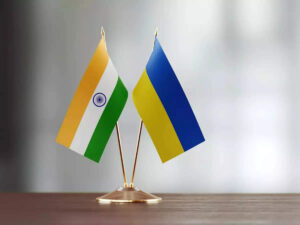

In August 2025, Ukrainians’ attitudes toward India were mostly neutral and partly negative. This is evidenced by the results of an all-Ukrainian sociological survey conducted by Active Group in cooperation with the Experts Club information and analytical center.
According to the results, only 16.0% of Ukrainian citizens demonstrated a positive attitude toward India (11.0% – mostly positive, 5.0% – completely positive). This country is negatively rated by 26.3% of respondents (20 . 7% – mostly negative, 5.7% – completely negative). At the same time, the vast majority – 55.3% – expressed a neutral attitude, and 2.7% said they did not have enough information.
“India remains one of the most important global players, but the country is not clearly defined in the public opinion of Ukrainians. This is influenced by both New Delhi’s political decisions in the international arena and limited cultural communication with Ukraine,” commented Maksym Urakin, founder of Experts Club.
He also drew attention to the economic dimension of bilateral relations:
“In the first half of 2025, the trade turnover between Ukraine and India amounted to more than $1.1 billion. At the same time, Ukrainian exports amounted to only $401.9 million, while imports from India exceeded $702 million. The negative balance of more than $300 million demonstrates a structural imbalance in trade,” Urakin emphasized.
In his turn, Active Group co-founder Oleksandr Poznyi added that these results indicate a cautious attitude of Ukrainians:
“Despite India’s economic weight and global status, the country remains remote and little understood for many Ukrainians. This explains the high level of neutral assessments and the low expression of positive emotions in society,” he emphasized.
The survey is part of a broader research program that analyzes international sympathies and antipathies of Ukrainians in the current geopolitical context.
The full video can be viewed here:
https://www.youtube.com/watch?v=YgC9TPnMoMI&t
You can subscribe to the Experts Club YouTube channel here:
https://www.youtube.com/@ExpertsClub
ACTIVE GROUP, DIPLOMACY, EXPERTS CLUB, INDIA, Poznyi, SOCIOLOGY, TRADE, URAKIN
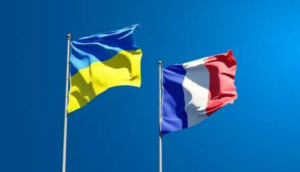

The level of sympathy for France among Ukrainians remains high. This is evidenced by the results of an all-Ukrainian sociological survey conducted by Active Group in cooperation with the Experts Club information and analytical center in August 2025.
According to the survey, 75.0% of Ukrainian citizens have a positive attitude toward France (49.3% are mostly positive, 25.7% are completely positive). Only 4.0% of respondents have a negative perception of this country (3 . 0% – mostly negative, 1.0% – completely negative). Another 20.0% remain neutral, and 1.3% said they do not have enough information about France.
“For many Ukrainians, France is a symbol of support in difficult times, as well as a cultural and political reference point in Europe. Such indicators demonstrate high trust and respect, which is largely due to the active role of Paris in European policy towards Ukraine,” said Oleksandr Poznyi, co-founder of Active Group.
In his turn, Maxim Urakin, founder of Experts Club, emphasized the importance of France in economic cooperation.
“In the first half of 2025, the trade turnover between Ukraine and France amounted to more than $1.37 billion. At the same time, exports of Ukrainian goods amounted to only $395.6 million, while imports from France reached $979.4 million. The negative balance of more than $583 million indicates a significant dependence of our market on French goods, but also the importance of France as an economic partner,” he said.
The survey is part of a broader research program that analyzes international sympathies and antipathies of Ukrainians in the current geopolitical context.
The full video can be viewed here:
https://www.youtube.com/watch?v=YgC9TPnMoMI&t
You can subscribe to the Experts Club YouTube channel here:
https://www.youtube.com/@ExpertsClub
ACTIVE GROUP, DIPLOMACY, EXPERTS CLUB, FRANCE, Poznyi, SOCIOLOGY, TRADE, URAKIN

Most Ukrainians have a positive attitude toward Moldova, as evidenced by the results of a sociological study conducted by Active Group in collaboration with Experts Club in August 2025.
According to the data, 51.3% of respondents have a positive attitude towards the neighbouring country (34.0% — mostly positive, 17.3% — completely positive). Only 4.7% of respondents have a negative attitude (4.3% — mostly negative, 0.3% — completely negative). At the same time, 42.0% of citizens remain neutral, and another 2.3% said they did not have enough information about Moldova.
“Despite difficult historical relations and various political challenges, Ukrainians’ attitude towards Moldova is rather warm and friendly. This is explained by both geographical proximity and similar cultural traditions,” said Active Group CEO Oleksandr Pozniy.

In turn, co-founder of Experts Club Maksim Urakin emphasized the importance of economic cooperation between the two countries:
“In 2025, Ukraine maintains a significant positive trade balance with Moldova — over $448 million. Ukrainian exports amounted to about $519 million, while imports — only $70.9 million. The total volume of bilateral trade reached $590 million, and this dynamic indicates Moldova’s stable interest in Ukrainian goods,” he stressed.
The study is part of a large-scale project analyzing Ukraine’s international sympathies and economic relations.
The full video can be viewed at: https://www.youtube.com/watch?v=YgC9TPnMoMI&t
You can subscribe to the Experts Club YouTube channel here: https://www.youtube.com/@ExpertsClub
ACTIVE GROUP, EXPERTS CLUB, MOLDOVA, Pozniy, RELATIONS, SOCIOLOGY, TRADE, UKRAINE, URAKIN
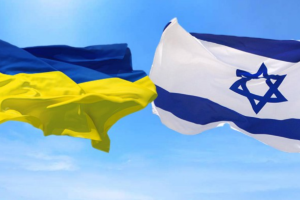
According to the results of a survey conducted by Active Group and Experts Club in August 2025, Ukrainians tend to have a positive attitude toward Israel.
Thus, 44.7% of respondents expressed sympathy for this country (32.7% — mostly positive, 12% — completely positive). Negative assessments accounted for 13.7%, another 40% remained neutral, and 1.7% admitted that they did not know enough about Israel.
“Despite a certain percentage of criticism, Ukrainians’ attitude toward Israel remains generally positive. This is explained by both historical ties and cooperation in the fields of medicine, science, and military technology,” commented Active Group CEO Oleksandr Pozniy.
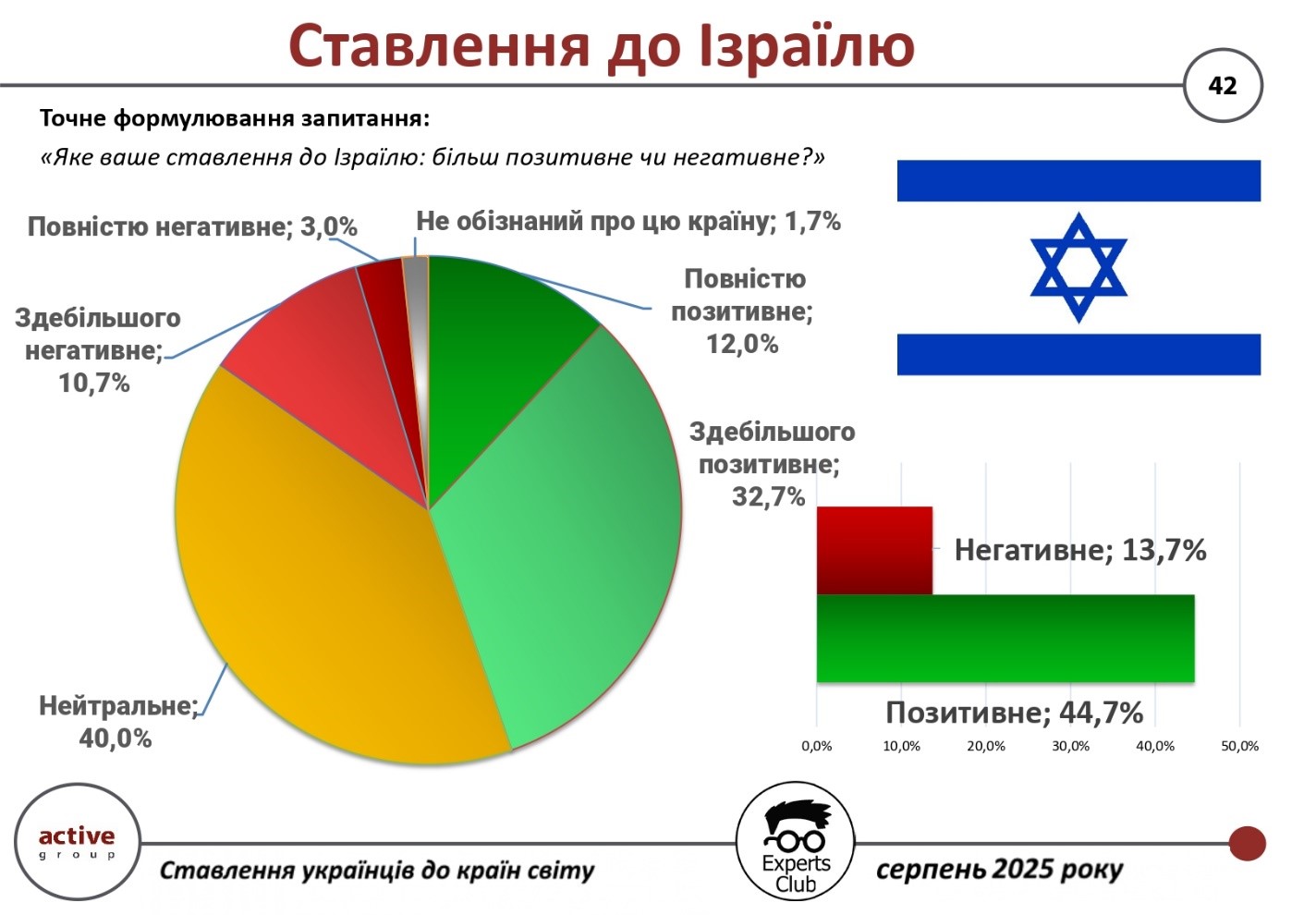
In turn, Maksim Urakin, co-founder of Experts Club, drew attention to the trade and economic component:
“At the end of 2025, bilateral trade between Ukraine and Israel amounted to more than $353 million. Ukrainian exports amounted to $132.4 million, while imports of Israeli goods exceeded $221 million. This led to a negative balance of about $88.6 million. Such an imbalance indicates the need to expand Ukrainian exports and search for new niches in the Israeli market,” he stressed.
Thus, Ukrainians’ attitude toward Israel is moderately positive, but economic indicators show challenges that should be taken into account in bilateral relations.
The full video can be viewed at: https://www.youtube.com/watch?v=YgC9TPnMoMI&t
You can subscribe to the Experts Club YouTube channel here: https://www.youtube.com/@ExpertsClub
ACTIVE GROUP, EXPERTS CLUB, ISRAEL, Pozniy, SOCIOLOGY, TRADE, UKRAINE, URAKIN